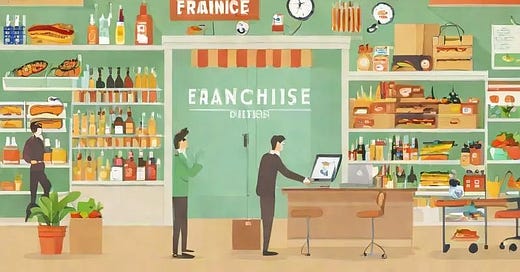Last year I worked with a client whose company made hard-working carryalls like messenger bags. The company was expanding and needed names for a couple of new collections, or product ranges1.— but the client didn’t call them “collections” or “ranges.” She called them franchises.
I’ve worked in or alongside American retail for a long time—my very first job, in high school, was at a Los Angeles department store, and I’ve since worked as a writer or consultant for many retail clients—but I’d never seen franchise used in this way. I chalked it up to this particular company’s internal jargon (it didn’t appear on their website).
And then, just last week, I received an email from Perricone MD, a cosmetics company, with franchise in its subject line:
Let’s leave aside “science-backed” and “results” for now—if you’re interested in beauty-industry hype, I recommend
‘s newsletter, “The Unpublishable.” Let’s look instead at this new, extended use of franchise.We’ve had franchise in English for more than seven centuries. A borrowing from French franchisse, it originally meant “free.” (It shares a root with frank, as in “May I speak freely?” or “May I speak frankly?”2). From there its meanings expanded to include “legal immunity,” “special privilege,” and, by the mid-19th century, “the right to vote.”3 In late-19th-century North America it took on a new sporty meaning that branched out from the “special privilege” sense: “The authorization, as granted by a professional league, to own and operate a team as a member of that league. Also: a team granted such authorization” (per OED online). Its first published use with that sense was in the New York Times, January 9, 1885: “It is believed here that Mr. Lucas has purchased the franchise of the Cleveland Club.”
The non-sporting-business sense of franchise is also originally North American: “An authorization granted to an individual or group to trade in a particular area for a stated period, usually in return for royalties, a share of the profits, etc.” (Also OED.) That sense emerged around 1903; it’s the sense that Substack’s AI was struggling to depict in the image at the top. There are different types of business franchise, but they all involve someone (or some mega-corporation) owning a business and granting someone else (the franchisee) the “special privilege” of operating it.
Finally, there’s franchise in the entertainment-world sense: “A general title, format, or unifying concept used for creating or marketing a series of products (esp. films, television shows, etc.).” (OED again.) This sense is “originally U.S.”; the earliest citation in the online OED is from July 9, 1935, in the New York Times: “Warner Brothers hold their G-Man franchise with ‘Public Enemy's Wife’ at the Strand.” Here’s a more recent example from Merriam-Webster: “The main reason we all keep going back to the ‘Mission: Impossible’ franchise is the stunts, of course. Watching Ethan Hunt as he scales mountains, jumps onto planes and dangles from skyscrapers fills us with eye-rolling delight” (Mercury-News, July 25, 2018).
No standard dictionary I consulted has the specific sense of franchise that I’ve encountered with my messenger-bag client or Perricone MD. It looks like an extension of the entertainment sense: Instead of “films, television shows, etc.” we have tangible stuff like bags and face creams.
Have you seen franchise used in any novel ways? Exercise your franchise by leaving a comment.
See Lynne Murphy’s Separated by a Common Language blog for a discussion of collection, line, and range in the U.K. and the U.S.
You sometimes see “free and frank” as a standard phrase (or “irreversible binomial,” to use the linguistic term). “Free and frank” is redundant in the same way “null and void,” “hue and cry,” “due and payable,” and “aid and abet” are. These terms are called legal doublets, and we have them because of the transition in Britain “from a native English term to a Latin or Law French term,” to cite Wikipedia. In other words: 1066 and all that.
I wrote about the “right to vote” sense in a February 2020 column about the language of women’s suffrage.







Just a note- aid and abet are two different things- aid means assist, abet means encourage.
I've always thought it was strange that sports commentators will refer to a team as a "franchise" — it seemed to be emphasizing the financial/business aspect in a way that I didn't think sports fans would prefer. It never occurred to me that that use might actually be older than the chain store/restaurant use!